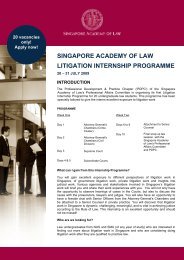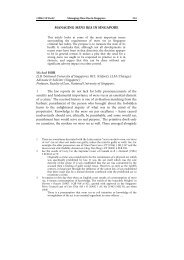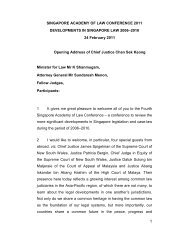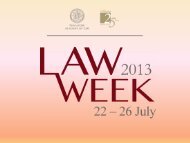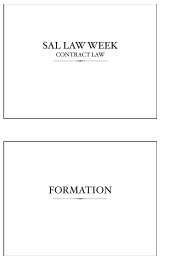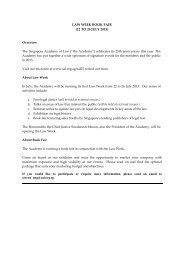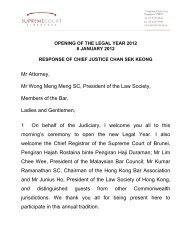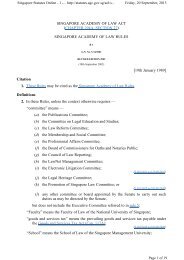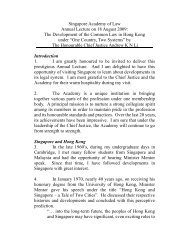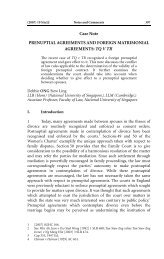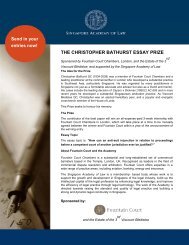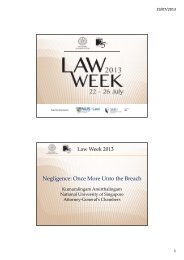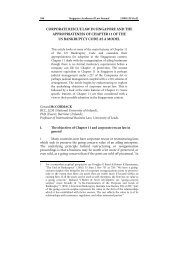View Article - Singapore Academy of Law
View Article - Singapore Academy of Law
View Article - Singapore Academy of Law
Create successful ePaper yourself
Turn your PDF publications into a flip-book with our unique Google optimized e-Paper software.
15 SAcLJ Matrimonial Assets and the 3 rd Party 293<br />
(iii)<br />
(iv)<br />
The hearing will take place in chambers 124 ; and<br />
Witnesses may only be cross-examined with the court’s<br />
leave.<br />
202 It is submitted that the procedural regime governing the ordinary<br />
civil suit is not necessarily more advantageous to all parties. In respect <strong>of</strong><br />
items (i) and (ii) for each <strong>of</strong> the above categories, it is submitted that<br />
parties will be able to set out and ascertain the other parties’ cases<br />
whether they are set out in pleadings or affidavits. Indeed, the ancillary<br />
matters procedure, with its several “rounds" <strong>of</strong> reply affidavits, would<br />
seem to give the parties more than one chance to set out their case, and<br />
even to raise queries concerning the other parties’ cases, unlike the more<br />
structured pleadings regime. In respect <strong>of</strong> item (iii) for each <strong>of</strong> the above<br />
categories, there seems to be no obvious advantage, as far as the parties<br />
are concerned, <strong>of</strong> having the matter heard in open court rather than in<br />
chambers. A chambers hearing would in fact give the parties more<br />
privacy.<br />
203 It is submitted that the most significant procedural difference lies<br />
in item (iv)—the right <strong>of</strong> cross-examination. It is beyond the scope <strong>of</strong><br />
this article to discuss the advantages or otherwise <strong>of</strong> being able to crossexamine<br />
witnesses. Suffice to say that it is still open to the party in an<br />
ancillary matters hearing who wishes to apply for cross-examination <strong>of</strong><br />
any witness to file a summons-in-chambers together with a supporting<br />
affidavit to seek the court’s leave to do so before the said ancillary<br />
matters hearing. This was done in Audrey Lee Dawn, supra, and Ong<br />
Tong Liang, supra, for example.<br />
204 It is therefore submitted that the court should lean in favour <strong>of</strong><br />
adopting the ancillary matters hearing procedure in circumstances where<br />
the ancillary matters have been consolidated to be heard with the civil<br />
suit, or ordered to be tried at the same time as the civil suit. This is<br />
because <strong>of</strong> the unique nature <strong>of</strong> family and family-related disputes,<br />
where there is a concern to protect the privacy <strong>of</strong> the parties. In this<br />
regard, see the discussion in Section 5.3 above.<br />
124 As a matter <strong>of</strong> practice, all ancillary matters in respect <strong>of</strong> which no consent order has<br />
been recorded on the date <strong>of</strong> the granting <strong>of</strong> the decree nisi will be adjourned to be<br />
heard in chambers after the granting <strong>of</strong> the decree nisi.



